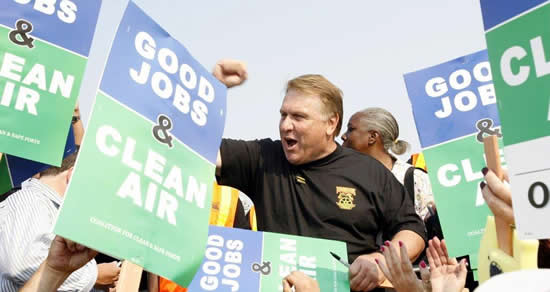Uncategorized
Q&A with General President Jim Hoffa

Q: Why should the average American be concerned about the TPP?
A: Because trade talks are being conducted secretly with only the involved negotiators from the U.S. and 11 other Pacific Rim countries having a full understanding of what is being discussed. I don’t have access to the bracketed text which gives a clearer idea of all the positions staked out by involved nations. And members of Congress, who will ultimately vote on the agreement, can’t access the full language either.
Q: What are the possible repercussions that could accompany passage of the TPP?
A: We really don’t know for sure, and that is part of the problem. However, many have raised concerns about how the deal could impact American jobs, labor provisions, food safety, the environment, you name it. The TPP’s reach goes beyond trade and into rules that would govern nations.
Q: Some have framed this trade agreement as a race to the bottom. Why is that?
A: It has to do with some of the countries involved in these negotiations. Take Vietnam, for instance. You can’t trade with a country run by a communist government. When the Department of Homeland Security wants to buy something, they’re going to be buying it from Vietnam because of the cheap wages they pay. Does anyone really think this is a good idea?
Q: The Obama administration and other supporters of the TPP say the trade deal will help grow the U.S. economy. What are they missing?
A: This administration and other administrations have been of the mind that increased trade with few safeguards put in place will benefit America. But we have huge trade deficits with Mexico and Canada due to NAFTA, and we are going to have the same with all these other countries. While it may be a boon to the bottom lines of big business, it won’t help middle-class families.
Q: The Teamsters represent some 30,000 U.S. dairy workers. How would the TPP affect that industry?
A: There are a million people in the dairy industry that would be threatened by the agreement. Frontera, a New Zealand dairy company subsidized by the government, could inundate this country and cause significant job losses.
Q: Earlier this year Japan decided to join the TPP negotiations. What concerns does their participation raise?
A: The Teamsters were already skeptical about this secret trade deal before Japan signaled its intention to join them. Now we are extremely skeptical given the history of our trade imbalance with Japan, especially in the auto industry, where we have lost so many good jobs.
Q: What do the Teamsters want to tell the public when it comes to the TPP?
A: This union is not against trade, just unfair trade. We’ve seen enough lost jobs, closed-down plants and crippled communities left behind. It’s time to rebuild the middle class, not tear it down, and that means approving trade deals that benefit working Americans. We need to tell our government to stop big corporations from shipping our jobs overseas.
Q: Speaking of shipping off good jobs, are Mexican trucks allowed to travel on U.S. highways beyond the border zones?
A: Some are. The Federal Motor Carrier Safety Administration is running a pilot program that lets qualifying Mexican trucks travel beyond that zone. Also, the government decided to grandfather five Mexican carriers that had gotten operating authority under NAFTA before a 1982 moratorium went into effect.
Q: How many trucks are in the pilot program?
A: Very few. According to the last report, only 12 carriers are in the program, with only 44 trucks and 44 drivers.
Q: When does the pilot program end?
A: It is set to expire in October 2014. However, there are so few participants in the program that it’s likely the Federal Motor Carrier Safety Administration (FMCSA) will have to seek approval from Congress to extend it.
Q: Why will it have to be extended?
A: Because the law requires a pilot program to have a statistically valid sample of participants. The purpose of this pilot program is to evaluate whether opening the border to Mexican trucks will have an impact on U.S. highway safety. You can’t tell that one way or the other if there aren’t enough participants to make a decision based on actual data.
Q: Are there any other problems with the pilot program, aside from lack of enthusiasm for it?
A: First, the pilot program doesn’t require the Mexican drivers or Mexican trucks to meet the same safety standards that U.S. drivers and trucks have to meet. Second, we are concerned about the level of drug violence in Mexico. Trade is supposed to be a two-way street, but no U.S. driver wants to drive into Mexico while the drug war is going on. Third, Mexican trucks tend to be older and more polluting than U.S. trucks, but the federal government gave the go-ahead for the program before the environmental impact could be assessed. Fourth, FMCSA has let carriers with abysmal safety records into the program.
Q: What are the Teamsters doing about it?
A: We filed a lawsuit asking the federal court to stop the program. The courts sided with the government, but nothing in the decision said Mexican trucks are safe. So we appealed the decision based on the court’s inconsistent interpretation of travel in interstate commerce and the U.S. Department of Transportation’s failure to follow the rules for environmental review.
Q: What is the status of that lawsuit?
A: The federal government just filed a reply to our request for a review. We don’t think we’ll get a response from the court for several months.